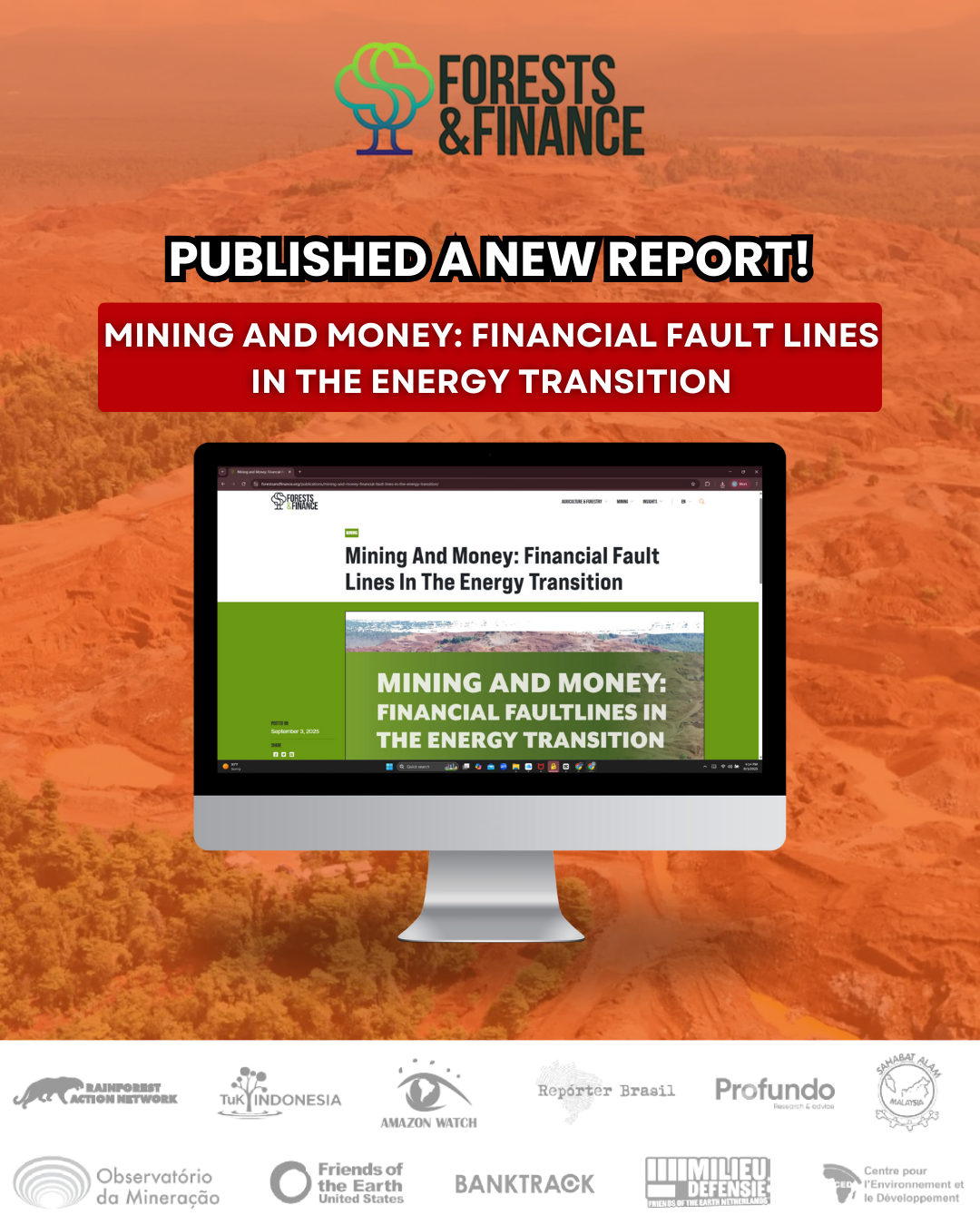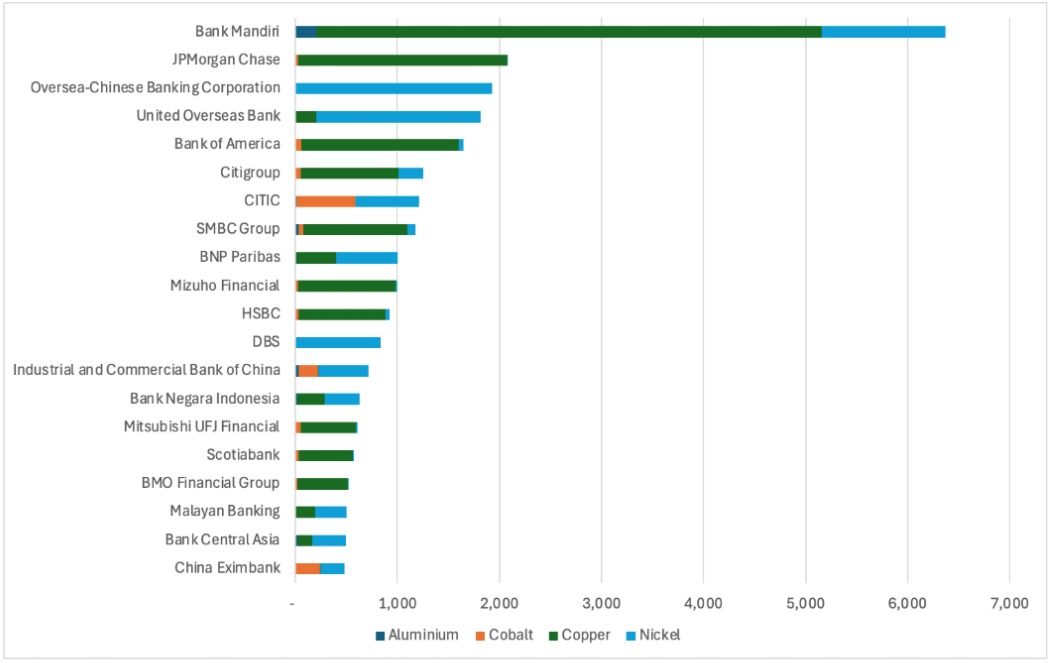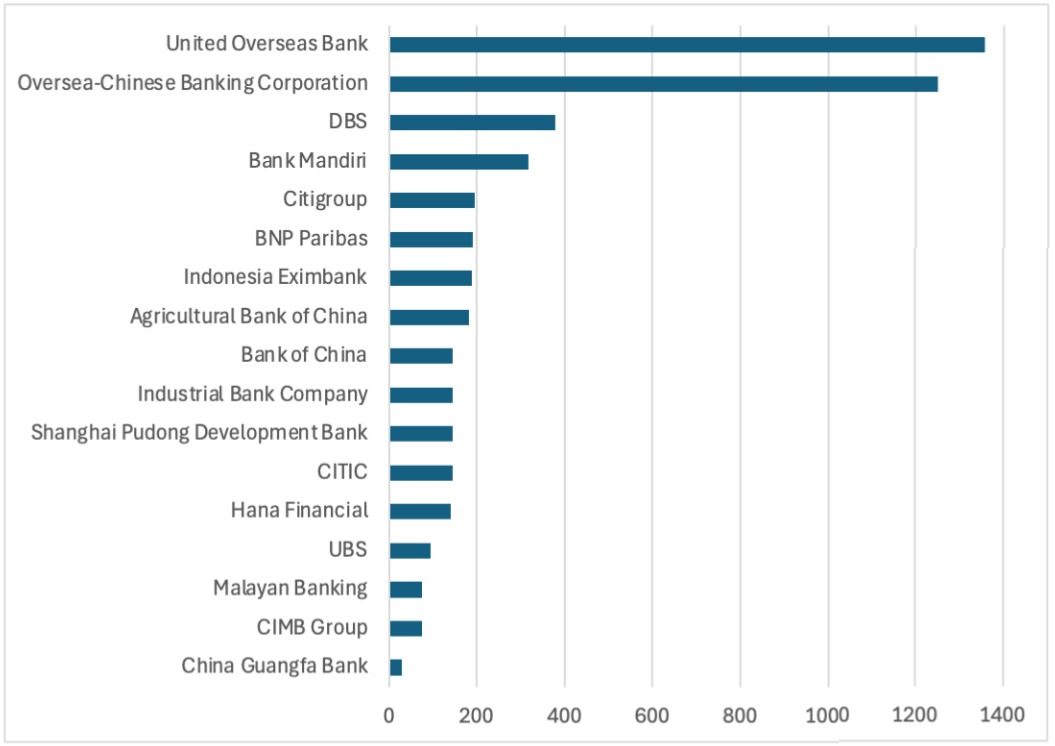18 September 2025 6 menit
Mining & Money Report: Uncovering the Flow of Funds to Finance Transitional Mineral Mining Contributes to Environmental Destruction and Human Rights Violations in Indonesia

Waingapu, September 18, 2025 — A report by the Forests & Finance Coalition, with support from civil society partners around the world, titled “Mining and Money: Financial Fault Lines in the Energy Transition,” reveals that between 2016 and 2024, the world’s major banks poured $493 billion in loans and guarantees into transitional mineral mining companies, while investors contributed $289 billion in bonds and stocks as of June 2025.
This report links how loans and guarantees made by banks and investors for transitional mineral mining such as cobalt, nickel, lithium, and copper are also responsible for deforestation, pollution, violations of Indigenous Peoples’ rights, unsafe labor practices, the use of new coal-fired power plants, dam collapses, and toxic waste leaks that have fatal consequences for local communities and ecosystems.
“Although these minerals are openly promoted as contributing to the energy transition using labels such as ‘environmentally friendly’ and ‘sustainable’, in reality the mining and financing of transition minerals are far from clean, green, sustainable, or equitable,” said Linda Rosalina, Executive Director of TuK INDONESIA, who is also part of the Forest & Finance coalition.
The report identifies JPMorganChase, Bank of America, Citi, and BNP Paribas as the largest banks financing destructive transition mineral mines. On the investment side, BlackRock, Vanguard, and Capital Group have poured billions of dollars into bonds and shares of giant mining companies such as Glencore, Vale, and BHP.
Despite public commitments to sustainability, the average environmental, social, and governance (ESG) policy score for mining among 30 large institutions assessed by Forests & Finance was only 22%. Many companies have no policies whatsoever to prevent waste management failures, land grabbing from indigenous peoples, or deforestation, even though mining is known to be a high-risk sector.
“This should serve as a warning to every policymaker, banker, and investor that they cannot build a just energy transition future by trampling on rights, displacing communities, and destroying biodiversity,” said Stephani Dowlen, a forest activist from Rainforest Action Network, a member of the Forests & Finance Coalition. “A Just Transition requires a financial sector that no longer lends to companies with a track record of environmental destruction and human rights violations, including corporate immunity.”
Transition mineral mining companies operating in Indonesia that have been identified as receiving funding since 2016 include Freeport-McMoRan from the United States, Amman Mineral International and Harita Group from Indonesia, as well as Lygend Resources & Technology and Zhejiang Huayou Cobalt from China. The majority of the investment value is held by Freeport-McMoRan from the United States, worth nearly USD 22 billion in mid-2025. Zhejiang Huayou Cobalt from China received USD 197 million, making it the second-largest recipient, followed by Vale from Brazil with USD 77 million.
Meanwhile, Bank Mandiri has been the largest funder among the top 20 banks responsible for providing USD 6.4 billion, or 20% of the total credit for transitional mineral mining operations in Indonesia.

The 20 Largest Banks Financing Transitional Mineral Mining in Indonesia from 2016 to 2024 (in millions of USD)
In Indonesia, Harita Group’s nickel operations on Obi Island, part of the ecologically sensitive Coral Triangle, are now threatening coral reefs and causing fishing communities to lose their livelihoods. Harita is one of Indonesia’s most influential conglomerates, with most of its operations in the palm oil and transition minerals sectors. Harita Group’s nickel operations use coal and mining waste (tailings), which have contaminated water sources and impacted communities. Although Harita executives have been aware of the ongoing pollution since 2012, in 2021 Harita built Indonesia’s first large-scale high-pressure acid leaching (HPAL) refinery. This highly chemical-intensive process produces large amounts of toxic waste that also requires responsible management—adding to the concerns of a company that was already facing allegations of pollution. However, this reality was followed by a successful initial public offering (IPO) that raised significant investment in 2023, despite concerns raised by the Mining Advocacy Network (JATAM) and Trend Asia.

Harita Mining’s operational creditors in Indonesia 2016–2024 (in millions of USD)
Nickel mining operations with a history of environmental pollution are also operating in Morowali, Central Sulawesi, by PT Indonesia Morowali Industrial Park (IMIP) Bahodopi, as the largest nickel industrial area in Indonesia. The existence of IMIP has triggered a severe environmental and health crisis in Morowali. Monitoring conducted by TuK INDONESIA and AEER (2023) shows that air quality has been polluted, with concentrations of SO₂, PM2.5, and PM10 exceeding national standards. This exposure increases the risk of acute respiratory infections (ARI), lung cancer, cardiovascular disease, and even premature death among workers and the surrounding community. Findings from Forests & Finance also identified that between 2016 and 2024, Tsingshan Group’s creditor, CSC Financial, actually funded the company to the tune of USD 59.1 million.
“The fact that Harita Group and IMIP were able to obtain financial and political support for high-risk projects, while they still face allegations of water pollution, air pollution and human rights violations, is truly worrying,” said Linda.
The Forests & Finance Coalition warns that without fundamental reforms, the energy transition will only reinforce exploitative and high-risk models that damage the climate and nature and hinder development goals. The report calls on governments, banks, and investors to align financing with a just, equitable, and sustainable transition by:
- Respecting Human Rights — including the Rights of Indigenous Peoples, Free, Prior, and Informed Consent (FPIC), labor standards, and protection for human rights defenders.
- Protecting nature — not financing companies linked to deforestation, biodiversity destruction, water pollution, and unsafe waste management.
- Strengthening accountability — through human rights and environmental due diligence, supply chain tracing, transparency, and grievance mechanisms.
- Aligning with climate and nature frameworks — requiring credible climate transition plans and ending fossil fuel financing.
- Setting red lines — excluding clients with a track record of repeated or unresolved rights violations, environmental damage, or failure to resolve conflicts.
Media contact: Annisa N Fadhilah ([email protected]/0878844466400)
Note to editors:
Forests & Finance is a coalition of eleven campaigning, grassroots, and research organizations: Rainforest Action Network (RAN), TuK INDONESIA (TuK), Profundo, Amazon Watch, Repórter Brasil, BankTrack, Sahabat Alam Malaysia (SAM), Friends of the Earth US (FOE), Centre pour l’Environnement et le Développement Cameroun (CED), Milieudefensie, and Observatório da Mineraçāo. We maintain an open-source database on financial flows to hundreds of companies involved in the production of commodities that put forests at risk, conduct annual assessments of bank and investor policies, and expose cases of deforestation and human rights violations linked to financial institutions. We coordinate investigations, analysis, advocacy, and campaigns to support community rights and control over land and forest management, and seek to hold the financial sector accountable for its role in facilitating social and environmental damage.
This post is also available in: Indonesian
